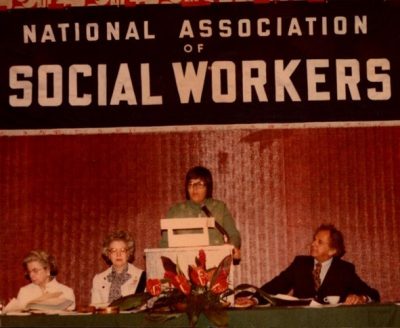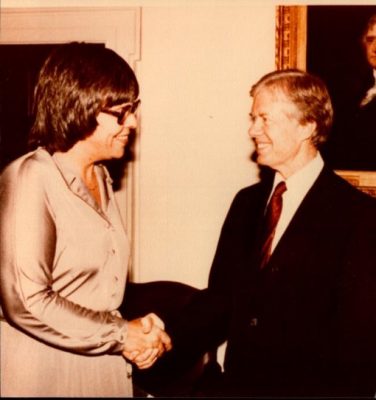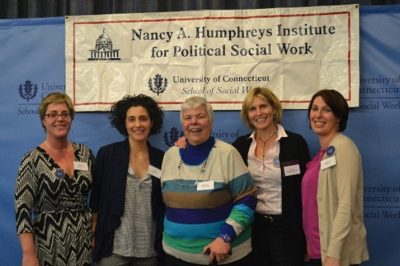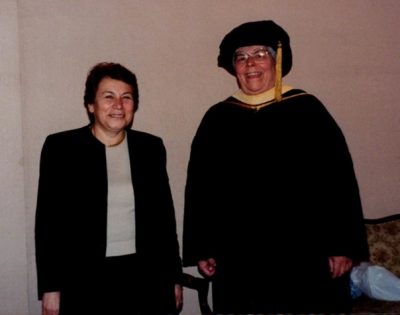 Nancy A. Humphreys will always be remembered as a pioneering social work educator and leader. She initiated a national effort to modernize the social work profession, helping to establish a new vision of the National Association of Social Workers (NASW) emphasizing the role of social work in policy and politics. She supported and encouraged generations of social workers and women to be leaders in organizations and elected office.
Nancy A. Humphreys will always be remembered as a pioneering social work educator and leader. She initiated a national effort to modernize the social work profession, helping to establish a new vision of the National Association of Social Workers (NASW) emphasizing the role of social work in policy and politics. She supported and encouraged generations of social workers and women to be leaders in organizations and elected office.
Nancy earned an MSW from the University of Southern California, while working for the Los Angeles County Department of Public Social Services, where she rose from a direct services worker to assistant program deputy and staff development administrator. After completing a DSW from UCLA (1975) she taught at USC, UCLA, California State University, LA, and California Polytechnic University, Pomona.
While still in California she played a crucial role in bringing 16 chapters of California NASW together into one statewide chapter, then served as its first president. She was elected the second woman and youngest person as president of the national NASW, and led the initiative to revise the Code of Ethics and to end discrimination against LGBT communities.
 Despite women being the majority of NASW’s membership, men had dominated leadership positions. Humphreys advocated for equality and making gender a permanent part of the organization’s affirmative action plan. She appointed the first female editor of Social Work journal, created the first women’s conference in social work, and was appointed by President Jimmy Carter as a member of his National Advisory Committee on Women’s Issues, the only social worker.
Despite women being the majority of NASW’s membership, men had dominated leadership positions. Humphreys advocated for equality and making gender a permanent part of the organization’s affirmative action plan. She appointed the first female editor of Social Work journal, created the first women’s conference in social work, and was appointed by President Jimmy Carter as a member of his National Advisory Committee on Women’s Issues, the only social worker.
After leaving California she taught at Rutgers University Graduate School of Social Work and became an Associate Dean, then moved to Michigan State University School of Social Work to assume the Directorship. While there she began to teach a course on women’s issues at the George Warren Brown School of Social Work, in Washington University. In 1987 she became the Dean of the University of Connecticut School of Social Work where she worked until she stepped down and established the Institute for Political Social Work Practice, later renamed as the Nancy A. Humphreys Institute for Political Social Work. While dean she helped spearhead the establishment of social work in the country of Armenia.
As the director of the Institute, she worked tirelessly to promote social workers becoming central to the political arena and establishing Political Social Work as a legitimate practice specialty. She also created the first social work campaign school, and encouraged students to strive for leadership positions in all aspects of politics and policy. 
Nancy Humphreys was appointed to numerous statewide and national boards throughout her career. While in New Jersey she was appointed by the Chief Justice of the State Supreme Court as one of the three public members to the court’s committee on Professional Legal Ethics. The Governor of Michigan appointed her as a member of the Blue-Ribbon Committee on Welfare Reform, as well as having served as a gubernatorial appointee and elected Chair of the Michigan Department of Social Services Advisory Council.
She served on the American Public Welfare Association, National Conference of Social Welfare, and was a past Vice President of the Council of Social Work Education. She was a member of the board of the Journal of Women and Aging.
After moving to Connecticut, she served as a board member of the Connecticut Association of Human Services, the Capital Area United Way, The statewide United Way Strategic Planning Committee and a member of the Simsbury Human Rights Committee. She was a “next friend” of one of the children in the Juan F. v. O’Neill lawsuit which resulted in the Department of Children and Families Consent Decree.
She also served as the spokesperson for the Connecticut Coalition for Children, and was appointed by the Chief Justice of the State Supreme Court and elected as the founding chair of the Parenting Education Advisory Committee. She chaired NASW’s Political Action Committee, and NASW’s National Committee on Legislation and Government Relations.
 In 2003, she was given a Lifetime Achievement Award from NASW. This recognition was added to many awards, and certificates of recognition for her service to the profession and those populations social workers serve including New Jersey’s Social Worker of the Year (1981), Distinguished Alumnus from USC Graduate School of Social Work, Distinguished Social Worker by the Connecticut Chapter of NASW (1992) and was a awarded an honorary Doctorate from Yerevan State University of Armenia. She was later inducted into the California Social Work Hall of Distinction in 2015.
In 2003, she was given a Lifetime Achievement Award from NASW. This recognition was added to many awards, and certificates of recognition for her service to the profession and those populations social workers serve including New Jersey’s Social Worker of the Year (1981), Distinguished Alumnus from USC Graduate School of Social Work, Distinguished Social Worker by the Connecticut Chapter of NASW (1992) and was a awarded an honorary Doctorate from Yerevan State University of Armenia. She was later inducted into the California Social Work Hall of Distinction in 2015.